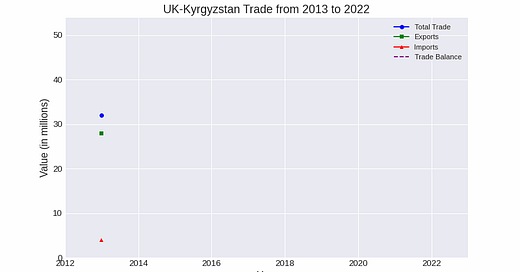Hello,
The world’s third-largest democracy went to the polls this week, with around a quarter of a billion people voting. This country is the only $1 trillion nation in ASEAN, has a unique relationship with the United Kingdom in the region, and is the world’s top provider of the critical mineral nickel.
Sadly, Indonesia is one of those nations that is often overlooked by Westminster and SW1. Indeed, for a nation that manages to successfully balance the US-China relationship in a way that many Western politicians could learn a lesson from, and sits as one of the most successful emerging market destinations for investors (ahead of Taiwan and South Korea), its no wonder that Chatham House’s Ben Bland concluded in a recent Foreign Affairs Committee session that “for the UK, I would say that no country is as important but as little understood as Indonesia.”
This UK-Indonesia bilateral is just one of several key relationships that could do with some proper love and attention from the British Government and the Foreign Office. As one senior diplomat from the region reminded me recently, you can win significant political goodwill and capital by showing up to these countries at a Prime Ministerial or Foreign Secretary level and properly listening.
Unfortunately for the British Government, the twin crises of the illegal Russian invasion of Ukraine and the ongoing conflict between Israel and Gaza have pulled political bandwidth away from a key arena - the Indo-Pacific. Our analysis of Foreign Secretary David Cameron’s global trips since taking office shows he has yet to visit the region at all. In this year of elections - including for the UK - it’s worth reminding ourselves that the Indo-Pacific at the start of 2024 may look very different by its end.
- Sam Hogg, Editor
In this week’s briefing, we examine:
David Cameron’s meeting with Wang Yi
A Government response on EV batteries and trade
Standard Chartered comments on China’s economy
Diplomacy Tracker
Anne-Marie Trevelyan,the UK’s Indo-Pacific Minister, visited Australia for IOC24 Politics
Although the House of Commons was on
half term holidayRecess this week, the trusty House of Lords trundled on. Peers grilled Foreign Secretary David Cameron on Tuesday, who was peppered with questions ranging from the ongoing Israeli response to Hamas through to AUKUS.Pressed on the topic of China and a potential upcoming meeting with a counterpart, Cameron said “One of the things we’re doing more generally is stressing the importance of the freedom of navigation, that lies behind the action that we’re taking in the Red Sea. And I’m going to be hopefully holding some discussions with Chinese counterparts in days to come, where I think we’ll be asking them, given the importance of trade to China, that they should be as fully supportive of freedom of navigation as we are, because that matters wherever you are in the world, including the Taiwan Straits.”
On AUKUS, Cameron was asked if he could see an expansion of AUKUS to include other countries. On Pillar II, which offers new technologies among other goodies, he responded that “we are open to the idea of other countries—possibly Canada, as people have mentioned, or Japan—which might want to join it because it is about defence equipment for the future.” Lord Dobbs then said “nobody has yet mentioned China, so allow me to do so. Will my noble friend agree that it is important that we continue to talk with China and find as many areas, and expand on as many areas, of agreement as possible? But, in all this discussion, is it not possible to focus too narrowly on the threat of China? Should we not do more to embrace the democracies in Asia, such as Japan, India, Malaysia and South Korea? They are already more populous than China, are growing economically much faster than China and, in a few years’ time, will be far more economically powerful than China.” Cameron replied “I very much agree with my noble friend. You can do both those things. It is important that we have a relationship with China. We have many disagreements, and it is an “epoch-defining challenge”, as the integrated review puts it, but, where we can find areas to progress discussions, we should.”
For those interested in the international debt situation, Cameron was also pressed on the issue. Lord Alton asked the Foreign Secretary if he could “confirm that, through China’s belt and road programme, developing nations are estimated to be indebted to China to the tune of more than $1 trillion? Does he share the view of Parliament’s Intelligence and Security Committee that it would be naive not to see how such punitive debt in countries such as Sri Lanka—which is $47 billion dollars in debt, half to China—can be used by China to buy support in the UN, to expand its military presence and for leverage in domestic and international institutions? How are we countering this?” Cameron responded that “One of the most important ways to counter it is by offering an alternative, so that when countries are developing there are other offers on the table,” before addressing the details of the question.
Elsewhere, Peers scrutinised the Government’s landmark Rwanda Bill. As has happened previously, a number levelled accusations that the Government’s plans for the Bill had the hallmarks of how the Chinese Communist Party (CCP) would engage, or that the Bill would give them ammunition to attack the United Kingdom’s legal credibility. Baroness Bennett asked Peers to imagine “how we would feel when the Chinese Government say, “Well, we’re just going to ignore the Sino-British joint declaration”—as indeed the Chinese Government do and we rightly condemn that behaviour. Lord Coaker added “Why can we say what we are saying to China about its attitude to Taiwan and its appalling attitude to Hong Kong? Because of international law…in the past, as [the Government spokesperson] will know, serious questions have been raised when people have been said to have acted in a way that was inconsistent with international law. That is its importance.”
In the media, Judith Cummins, Labour MP for Bradford South and co-chair of Labour Friends of Taiwan, penned an article in PoliticsHome on Taiwan’s application to join the CPTPP. She said “According to the CPTPP accession process, decisions about proceeding with candidates must be made within a “reasonable period of time”. Kicking the can further down the road cannot be the answer. The UK government will have to be clear about their vision for Taiwan’s future participation in the CPTPP.”



